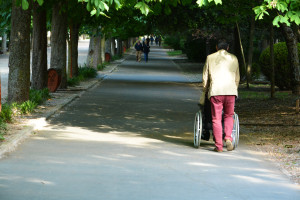Medicare is well-known for providing health insurance for people age 65 and older. However, Medicare can also provide health coverage for younger people with disabilities, so if you have a disability, it is important to know how you may qualify for Medicare. 
The first step is to apply for disability benefits through the Social Security Administration. To qualify for Social Security disability insurance (SSDI) benefits, you must not be working a substantial amount, you must have paid FICA taxes for a long enough period to qualify, and you must have a severe medical condition that prevents you from working and has lasted or is expected to last at least one year, or result in death. If you have not paid enough into the system with your taxes, then you may still be able to apply for Supplemental Security Income (SSI), if you meet the income and asset limits.
Once you have been entitled to Social Security disability benefits, or Railroad Retirement Board benefits, for 24 months, then you will automatically be enrolled in traditional Medicare (Parts A and B), as opposed to a Medicare Advantage plan (Part C). If you wish to switch to Medicare Advantage, or enroll in Medicare Part D prescription coverage, you may do so during your initial enrollment period, which starts three months before your 25th month of disability and ceases three months after your 25th month of disability. You may also make such changes during the yearly enrollment period, which is from October 15 to December 7 each year.
As noted above, after becoming entitled to SSDI benefits, there is a two-year waiting period to become eligible. However, there are two exceptions. People with amyotrophic lateral sclerosis (ALS) can get Medicare when they are entitled to receive disability benefits. For people with end-stage renal disease with kidney failure who require a kidney transplant or ongoing dialysis, Medicare coverage can start three months after your dialysis starts.
Learn more about our special needs planning and special education advocacy services at www.littmankrooks.com or www.specialneedsnewyork.com.
Was this article of interest to you? If so, please LIKE our Facebook Page by clicking here.
The post Can I Qualify for Medicare if I have a Disability? first appeared on SEONewsWire.net.]]>60% of these young caregivers remarked that care giving had negative impacts on their performance and attendance at school. In fact, a Bill and Melinda Gates Foundation study found that 22% of high school dropouts attribute caring for a family member to leaving school.
Many of the young caregivers mention feeling isolated from their friends because there was no time for after-school interaction. Some cited lack of support from school personnel. For these students, being labeled as a slacker because they fall asleep or are inattentive in class is common.
A youthful community the size of San Diego, care for grandparents, parents and other family members suffering from diseases including cancer, dementia, mental illness, diabetes, ALS, HIV and other chronic illnesses. Instead of spending time with peers and school activities, they bathe, feed and keep confused loved ones from wandering. 70% say they are a caregiver for a parent or grandparent, some spending 50% of their time doing so.
Instead of recognizing their quiet generosity and the emotional and economic stress experienced by the young caregivers, society and funding focuses on the adult caregiver.
So what can the rest of us do to support the youth who care for their loved ones?
- Besides asking about the patient, ask them how they are doing.
- Rather than buying something for the family, visit them. Personal interaction has more meaning, social benefit and is more rewarding for everyone.
- Learn more about the youth caregiver by going to http://www.aacy.org/.
- Teachers can help other students understand the challenges of the young caregivers so they don’t feel so isolated.
- Community and health organizations can start online support groups where caregivers interact with their peers who are experiencing similar issues.
This begs acknowledgment as a serious and growing public health issue. Communities, insurance companies, social organizations and providers should direct more resources to improve it.
If you need help arranging care for the elderly, please contact us.
The post The Little Known Youth Caregiver Among Us appeared first on Estate Planning Lawyers | Elder Law Attorneys | Brighton | Novi | Livonia Elder Law Attorneys.
The post The Little Known Youth Caregiver Among Us first appeared on SEONewsWire.net.]]> As baby boomers move up in years, the need for caregivers grows larger. Included in this population of caregivers is one demographic unknown to most of us. These are the youth ages 8-18 who help look after a loved one in poor health or disabled and there are about 1.3-1.4 million of them.
As baby boomers move up in years, the need for caregivers grows larger. Included in this population of caregivers is one demographic unknown to most of us. These are the youth ages 8-18 who help look after a loved one in poor health or disabled and there are about 1.3-1.4 million of them.
60% of these young caregivers remarked that care giving had negative impacts on their performance and attendance at school. In fact, a Bill and Melinda Gates Foundation study found that 22% of high school dropouts attribute caring for a family member to leaving school.
Many of the young caregivers mention feeling isolated from their friends because there was no time for after-school interaction. Some cited lack of support from school personnel. For these students, being labeled as a slacker because they fall asleep or are inattentive in class is common.
A youthful community the size of San Diego, care for grandparents, parents and other family members suffering from diseases including cancer, dementia, mental illness, diabetes, ALS, HIV and other chronic illnesses. Instead of spending time with peers and school activities, they bathe, feed and keep confused loved ones from wandering. 70% say they are a caregiver for a parent or grandparent, some spending 50% of their time doing so.
Instead of recognizing their quiet generosity and the emotional and economic stress experienced by the young caregivers, society and funding focuses on the adult caregiver.
So what can the rest of us do to support the youth who care for their loved ones?
- Besides asking about the patient, ask them how they are doing.
- Rather than buying something for the family, visit them. Personal interaction has more meaning, social benefit and is more rewarding for everyone.
- Learn more about the youth caregiver by going to http://www.aacy.org/.
- Teachers can help other students understand the challenges of the young caregivers so they don’t feel so isolated.
- Community and health organizations can start online support groups where caregivers interact with their peers who are experiencing similar issues.
This begs acknowledgment as a serious and growing public health issue. Communities, insurance companies, social organizations and providers should direct more resources to improve it.
If you need help arranging care for the elderly, please contact us.
The post The Little Known Youth Caregiver Among Us appeared first on Estate Planning Lawyers | Elder Law Attorneys | Brighton | Novi | Livonia Elder Law Attorneys.
The post The Little Known Youth Caregiver Among Us first appeared on SEONewsWire.net.]]>DOD should know that ALS afflicts US Military Veterans at twice the rate of the civilian population. The data which VA, ALS, Harvard University and many medical schools have reviewed supports this conclusion. The reason for the startling medical fact is unknown at this time.
In fact, no one knows why U.S. military veterans are twice as likely to develop ALS than the general population, or why those who deployed during the Gulf War in 1990-91 may be twice as likely to get the disease as other troops. Although it’s still a rare illness, affecting about 30,000 people across the country, it is so devastating to its victims and their families that the Departments of Defense and Veterans Affairs have made a mission out of trying to reduce their suffering.
Read more here: http://www.newsobserver.com/2014/03/08/3682151/more-vets-suffer-from-als-but.html#storylink=cpy
VA will treat ALS as a presumptive disease for veterans disability compensation purposes. So after viewing the 100th bucket of cold water being dumped on friends, relatives and celebrities, the challenge is getting a little tedious. However, it is raising money for necessary medical research. I just wish that DOD & VA would use this opportunity to let veterans and the general population know that this is a situation that is inflicting our veterans at twice the normal rate. Did you know that? Think about that or “paste” the above comment into your Facebook page next time a friend sends you one of those videos.
http://www.armytimes.com/article/20140821/NEWS05/308210042
Legal Help for Veterans, PLLC fights for veterans rights. We fight to make sure you get the benefits you deserve from the Department of Veterans Affairs. To learn more or contact a veterans attorney, visit http://www.legalhelpforveterans.com/ or call 800.693.4800
The post ALS “Ice Bucket Challenge” first appeared on SEONewsWire.net.]]>